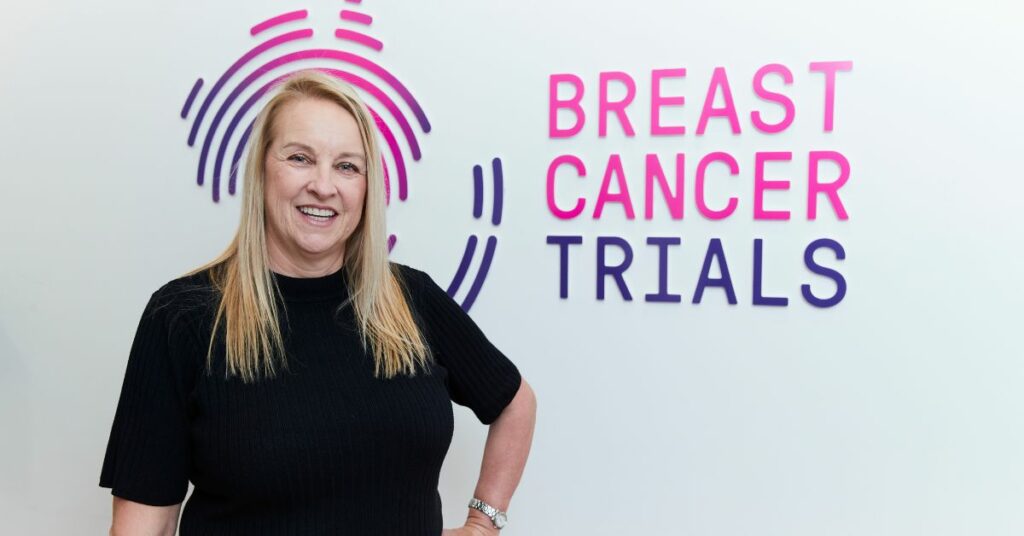Over 20,000 women are diagnosed with breast cancer each year, meaning 1 in 7 women are diagnosed at least once in their lifetime.
Breast Cancer Trials, a group consisting of world-leading breast cancer doctors and researchers based in Australia and New Zealand is committed to exploring and finding better treatments for people affected by breast cancer through clinical trials research.
Their research program brings together 800 researchers from 90 institutions throughout Australia and New Zealand.
Third Sector News interviewed Soozy Smith, the Chief Executive Officer of Breast Cancer Trials for more than 11 years on the positive impact their research program has on their participants.
As Breast Cancer Trials’ CEO for more than 11 years, what are some of the setbacks you’ve encountered and how do you keep your team motivated through them?
Breast Cancer Trials have been fortunate to have a strong supporter base built up over the past 25 years. Our fundraising team have developed strong relationships and connections with our supporters and we have people who have donated to us consistently for the past 25 years. Through the recent bushfires, droughts and pandemics our supporters still donated allowing us to continue our much-needed research.
The pandemic was the biggest setback we have had in my time at BCT. The various state lockdowns and hospital closures impacted our ability to recruit to many of our trials nationally, however, we worked closely with all our researchers and institutions to determine the best way to deliver our research program and we were able to continue albeit at a slower rate of recruitment.
Communication is the key. From the early days of the pandemic, I spoke regularly (via a weekly video) with the whole team explaining the situation at that time, assured them I was doing everything I could not to lose staff or reduce their hours and asked them to look for ways to keep our research going, asked them to forfeit a pay review for that year and urged them to bring any issues they were facing back to the leadership team so we could manage them. We had open dialect and we organised Teams trivia, and Teams morning teas, we encouraged all staff to connect whenever they could and provided a Gourmet hamper to say thank you for their support.
Which leadership strategies do you believe have significantly influenced you and your team?
Open honest dialect. We strive to make our meetings a safe place to discuss things with no fear of recrimination. We encourage direct conversations with no three ways. We do not all need to agree initially, however, we work through various scenarios and land on one that works best for the organisation. Once selected all the leadership team are expected to support and show a united front to the rest of the staff. I am a fan of Brene Brown and often refer to her various talks such as courage and vulnerability when considering difficult issues.
After conducting independent research into AUNZ’s largest oncology research group, what are some of your insights that will positively impact those who are living with breast cancer?
We have known for many years that the research we conduct has impacted not only patients and their immediate families but future generations, and the community and provided us with a platform to educate people about the work we do. The independent report by QUT confirms this and in addition, identifies that not only are we impacting Australian and New Zealand women but international women too.
How has the research program impacted Breast Cancer Trials’, the clinical trial participants and supporters?
Our research is recognised academically throughout the world as shown by the findings in the report that BCT publications are 10x the world benchmark for citations (indicators of scientific excellence). These papers form a basis for future research into new treatments and demonstrate that our researchers are respected and recognised nationally and internationally. All of the current standard-of-care treatments available for breast cancer has been proven through breast cancer trials and Breast Cancer Trials have participated in many of these trials providing access to potentially lifesaving drugs to trial participants before they are accessible to others. The report found a benefit-to-cost ratio (BCR) of 1.4 with anything greater than one demonstrating a positive net return for research investment. This and the patient benefits that our research provides mean that the investment that our supporters make to our research program delivers tangible and significant health and social benefits for the community.
What does the ideal future at Breast Cancer Trials look like for you?
Breast cancer is still the most diagnosed cancer in women. Until this is no longer the case we have much work to do. Our research has improved the outcomes for many women, however, I would like to see Breast Cancer Trials be in a position to offer more trials to more people and that a person’s place of residence is not the limiting factor to them accessing our trials.












